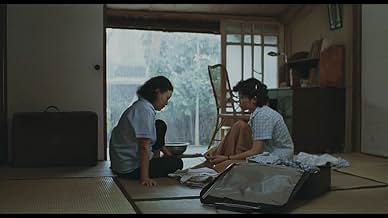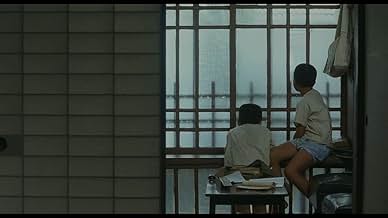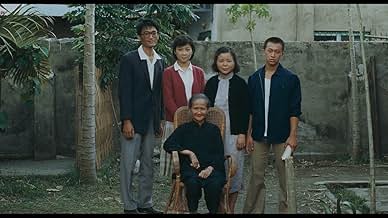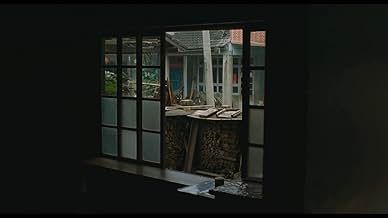IMDb RATING
7.5/10
3.8K
YOUR RATING
The semi-autobiographical film on director Hou Hsiao-Hsien's childhood and adolescence, when he was growing up in Taiwan, living through the deaths of his father, mother and grandmother.The semi-autobiographical film on director Hou Hsiao-Hsien's childhood and adolescence, when he was growing up in Taiwan, living through the deaths of his father, mother and grandmother.The semi-autobiographical film on director Hou Hsiao-Hsien's childhood and adolescence, when he was growing up in Taiwan, living through the deaths of his father, mother and grandmother.
- Awards
- 8 wins & 5 nominations total
- Director
- Writers
- All cast & crew
- Production, box office & more at IMDbPro
Featured reviews
I recommend A TIME TO LIVE AND A TIME TO DIE as a great introduction to the films of Hou Hsiao Hsien, who I consider the greatest director working today. Like most of his films, this one is about the telling of history, the effort to recreate the memories of the past, in this case his childhood memories growing up in rural Taiwan. His family has escaped Communist China but live as if they will make their return someday. That someday never comes, the family grows old, and members die one by one. These tragedies (filmed with heartbreaking solemnity) serve as punctuation marks for the film's narrative, which isn't so much concerned with plot details as it is with capturing the sense of what it was like to live at that time, as the kids develop their own sense of belonging, in a country they have adpoted just as it has adopted them. His method of editing and storytelling is something close to revolutionary, and he would refine it in his later films. His ability to set scene after impeccable scene and let the ideas ferment over their totality is unparalleled. This is perhaps his most accessible film, full of heart and pathos. It may seem slowgoing by Hollywood standards, but if you have the willingness to let it wash over you, you will be transported, both mentally and emotionally.
Very good movie in every aspect: acting, performance, cutting, quality of images, and plot. This is based on the true memories of the life of the director growing up in Taiwan. We follow this evolution in this movie in such realistic and natural images and scenes that we forget we are watching a movie and it looks like if we were watching real life scenes through someone's window. The main plot tells the story of a young boy who is dealing with family and other issues as he grows up during a certain period in Taiwan's history. A fascinating movie. Good foreign arthouse movies are so underrated on imdb and I don't even know why. I guess this site is for popular movies only and top 250 is ridiculous.
This film, which first brought Hou and the Taiwanese New Wave to international attention, seems deceptively simple, like your run-of-the mill growing-up-humbly-in-a-third-world-country narrative: a young boy, whose family has been transplanted from China to Taiwan, faces a hard path to adulthood complete with neighborhood tussles and family deaths. But gradually its manner of telling draws you in: at first, events seem like fragmented vignettes, but are actually blended in a succession that has been described as `like watching clouds floating by.' His propensity towards graphically composed, image-driven storytelling recalls the styles of Ozu, Satyajit Ray and even Tarkovsky, but where Hou excels is in applying his style towards an examination on the nature of history. For my money, there has never been a filmmaker as consumed by the idea of history than Hou, and this deeply autobiographical film may shed light on his motivations. By the time we reach the devastating ending, there's an overwhelming feeling of a time and place, an entire way of life, that has slowly disappeared before our eyes, but even more heartbreaking is the profound sense of guilt, of youthful opportunity squandered in hoodlum-like loitering, of parents whose presence was taken for granted until the sudden arrival of their ineffable absence. Watch this film to see how movies are humankind's noble, anxious attempt to retrieve lost time, and how the retrieval only reflects back on the mournful permanence of that loss.
10grapelli
Besides being a great film about an emerging new generation in Taiwan after the war, this film is also full of authentic atmosphere.
There is the Japanese style house the family lives in; Japanese sandals, nowadays still worn by some elder people. Ah-ha and his granny eating water ice after he passed the entrance exam for middle school - the ice machine with it's big wheel in the foreground. The only street lamp, the kids play under in the evenings; the games they play in the streets. The haircut of school children - boys three centimeters, girls three centimeters below their ears. Their school uniforms, some of them still the same in Fengshan today (believe me). Gangs fighting with water melon knifes and the little red police jeep.
The film is close to real everyday life in Taiwan at that time, although you won't find much of it there nowadays.
There is the Japanese style house the family lives in; Japanese sandals, nowadays still worn by some elder people. Ah-ha and his granny eating water ice after he passed the entrance exam for middle school - the ice machine with it's big wheel in the foreground. The only street lamp, the kids play under in the evenings; the games they play in the streets. The haircut of school children - boys three centimeters, girls three centimeters below their ears. Their school uniforms, some of them still the same in Fengshan today (believe me). Gangs fighting with water melon knifes and the little red police jeep.
The film is close to real everyday life in Taiwan at that time, although you won't find much of it there nowadays.
"A Time to Live and a Time to Die" reads like a family saga, but it is just as much a film about the passing of traditional China and the dislocation of exile. Of course the plot points are given away; Hou isn't interested in dramatic tension and Aristotelian unities--these are so dependent on Western ideas of
personality and the separation of individual and world that they make little
sense in China. He doesn't push the events in our faces, either--they just
happen, often in the middle distance with a tree in the foreground, the way real life happens. (Remember Auden's "Musee de Beaux Arts", with Icarus plunging
in the sea far off while a ploughman works on his field?)
The space Hou gives his events and his characters doesn't give us the intimacy with people that we expect in the West. But it gives us a rich sense of the
texture of life and the things that pass among members of a family and a
community, even one that is thrown together and can just as suddenly fall
apart, as it begins to here. It's that feeling for social space, in part, that allows this film and others of his to address social and historical questions without ever losing the sharp particularity of a personal story.
personality and the separation of individual and world that they make little
sense in China. He doesn't push the events in our faces, either--they just
happen, often in the middle distance with a tree in the foreground, the way real life happens. (Remember Auden's "Musee de Beaux Arts", with Icarus plunging
in the sea far off while a ploughman works on his field?)
The space Hou gives his events and his characters doesn't give us the intimacy with people that we expect in the West. But it gives us a rich sense of the
texture of life and the things that pass among members of a family and a
community, even one that is thrown together and can just as suddenly fall
apart, as it begins to here. It's that feeling for social space, in part, that allows this film and others of his to address social and historical questions without ever losing the sharp particularity of a personal story.
Did you know
- TriviaThis film is inspired by screenwriter-turned-director Hou Hsiao-Hsien's coming-of-age story. It is the second installment of Hou Hsiao-Hsien's "Coming-of-Age Trilogy" that features three prominent Taiwanese screenwriters' coming-of-age stories - the other two are Un été chez grand-père (1984) (inspired by the childhood memories of Chu Tien-Wen) and Poussières dans le vent (1986) (inspired by the coming-of-age story of Wu Nien-Jen).
- ConnectionsFeatured in When Cinema Reflects the Times: Hou Hsiao-Hsien and Edward Yang (1993)
- How long is A Time to Live and a Time to Die?Powered by Alexa
Details
- Release date
- Country of origin
- Official site
- Languages
- Also known as
- A Time to Live and a Time to Die
- Filming locations
- Production companies
- See more company credits at IMDbPro
Contribute to this page
Suggest an edit or add missing content
























